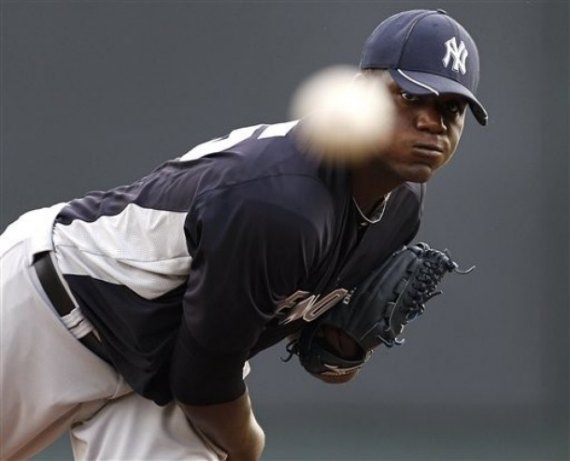
Last year, when he was competing for a spot in the Mariners rotation, Michael Pineda did not face intense scrutiny. People watched and dissected his performances, as they do for every pitcher. But given the Seattle media market combined with the Mariners current place in the baseball world, the attention paid him was relatively mild. One year later, you can’t click on three Yankees-related links without seeing a Pineda mention. And most of it isn’t exactly glowing.
The level of scrutiny that Pineda faces is new to him, though it’s not to us. We’ve seen it happen dozens of times before. In Pineda’s case it makes all the sense in the world. He’s a young pitcher with high expectations, due to his 2011 performance, his former top prospect status, and the trade that brought him to New York. Yet it seems that attention paid him has gone from intense to overkill. Let’s quickly review the timeline of Pineda’s brief Yankees tenure.
1. When the Yankees acquired Pineda, Brian Cashman himself said that Pineda adding a changeup to his arsenal was the key to his success. Many analysts and scouts agreed.
2. Pineda comes into camp overweight, a cause for instant criticism.
3. Pineda receives early praise for his changeup, and throws it often in his early spring outings.
4. Now lacking a point of criticism, the media turns to his missing velocity as a point of major concern.
5. He builds velocity over a few starts, going from 89-91 in his first start to hitting 94 in his most recent one. But that’s not 96-97, so the criticism continues.
It’s all a bit absurd, and it grows even more so. At least one beat writer has led the charge in calling for Pineda to start the season in AAA, criticizing him at every opportunity (and even when there is no clear opportunity). Thankfully, the Yankees don’t operate to satiate the media and their desire for clicks and page views. They operate in a manner that will benefit them on the field, both now and in the future.
Are there solid, logical arguments for Pineda to start the season in AAA? There is the issue of his service clock, which the Yankees could delay by starting him in the minors. That would afford them another year of control, making Pineda a free agent after the 2017 season rather than 2016. Held back long enough, they could even delay his arbitration clock, setting his first hearing for 2015 rather than 2014. That seems like a decent incentive, especially knowing the front office’s desire — nay, mandate, as Hal Steinbrenner tells it — to get under the $189 million luxury tax threshold for the 2014 season.
Today at FanGraphs Dave Cameron offered an additional argument. He points to Giants left-hander Madison Bumgarner, who, like Pineda, experienced a drop in velocity when he came into camp before the 2010 season. Cameron admits that the situations don’t line up, but I think he undersells the degree of difference between Pineda and Bumgarner. Bumgarner had experienced his velocity dip during the 2009 season. When it persisted in 2010 spring training, the Giants decided to keep him in the minors. This is quite different from Pineda, who not only spent all of 2011 in the majors, but also retained his velocity throughout (discounting his final start, which came on 11 days’ rest).
What both the service time and the Bumgarner arguments miss is the effect a minor league assignment would have on Pineda. Instead of looking at the situation from your armchair, look at it from Pineda’s point of view. He pitched successfully for a full major league season. He has pitched reasonably well all spring — better, certainly, than at least Ivan Nova, if not others. And now the Yankees are going to send you to the minors to work on your velocity, with the added benefit of them gaining more of your services for a cheaper price. Oh, and by the way, the Triple-A team is on a perpetual road trip because of stadium renovations. How would you feel if you were in his shoes? It’s an important consideration — as Joe Torre liked to say, there’s a heartbeat to the game.
If the Yankees feel that they can get the most out of Pineda by sending him to the minors, and if they think his confidence won’t go into the crapper, then it’s something to consider. But by all indications, this is a guy who has given it his all this spring. He might have shown up a bit overweight, but are we going to blame a 23-year-old for taking it easy the off-season after experiencing his most intense workload ever? Even so, Cashman says he’s already dropped 12 pounds and has worked as hard as anyone this spring. Is that someone you want to send away? Or is it someone you want to put in your rotation? He is, after all, one of the five most talented pitchers in camp. It seems like he should be treated as such.
Leave a Reply
You must be logged in to post a comment.